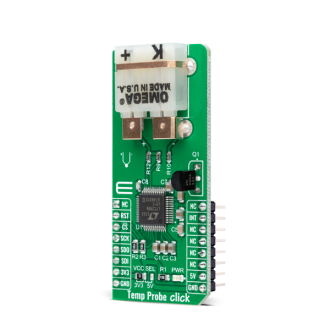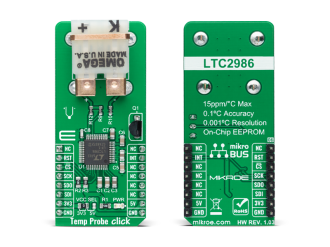
We strongly encourage users to use Package manager for sharing their code on Libstock website, because it boosts your efficiency and leaves the end user with no room for error. [more info]

Rating:
Author: MIKROE
Last Updated: 2020-12-29
Package Version: 1.0.0.0
mikroSDK Library: 1.0.0.0
Category: Measurement
Downloaded: 1692 times
Not followed.
License: MIT license
Temp Probe Click is a compact add-on board used as thermocouple temperature monitoring system. This board features the LTC2986, a high accuracy digital temperature measurement system used to directly digitize thermocouples with 0.1°C accuracy and 0.001°C resolution from Analog Devices.
Do you want to subscribe in order to receive notifications regarding "Temp Probe click" changes.
Do you want to unsubscribe in order to stop receiving notifications regarding "Temp Probe click" changes.
Do you want to report abuse regarding "Temp Probe click".


Library Description
Library performs a control of the Temp Probe Click board™ and performs a configuration on which way temperature be measured. Library offers a choice to measure temperature on the desired channel/channels, depending on the cold junction channel. The device can use a lot of different sensors for measurement, such as thermocouples, diodes, sense resistors, thermistors... For more details check documentation.
Key functions:
uint8_t tempprobe_write_byte( uint16_t reg_addr, uint8_t data_in ) - .uint8_t tempprobe_read_word( uint16_t reg_addr, uint32_t *data_out ) - .uint8_t tempprobe_write_eeprom( void ) - Function writes the current settings from the chip registers to the EEPROM memory and checks is error occurred.uint8_t tempprobe_read_temp( uint16_t sel_channel, float *data_out ) - Function reads temperature data from the desired channel.Examples description
The application is composed of three sections :
void application_task ( )
{
uint8_t check_state;
tempprobe_write_byte( TEMPPROBE_REG_COMM_STATUS, TEMPPROBE_START_CONV );
check_state = tempprobe_check_busy( );
while ( check_state != TEMPPROBE_NO_BUSY_STATE )
{
check_state = tempprobe_check_busy( );
}
mikrobus_logWrite( ">> PN-Junction: ", _LOG_TEXT );
tempprobe_read_temp( TEMPPROBE_REG_PN_JUNCTION_CONV_RES , &temperature_k );
FloatToStr( temperature_k, demo_text );
mikrobus_logWrite( demo_text, _LOG_LINE );
mikrobus_logWrite(">> Thermo K: ", _LOG_TEXT );
tempprobe_read_temp( TEMPPROBE_REG_THERMO_K_CONV_RES, &temperature_pn );
FloatToStr( temperature_pn, demo_text );
mikrobus_logWrite( demo_text, _LOG_LINE );
Delay_ms( 1500 );
}
Other mikroE Libraries used in the example:
Additional notes and informations
Depending on the development board you are using, you may need USB UART click, USB UART 2 click or RS232 click to connect to your PC, for development systems with no UART to USB interface available on the board. The terminal available in all MikroElektronika compilers, or any other terminal application of your choice, can be used to read the message.